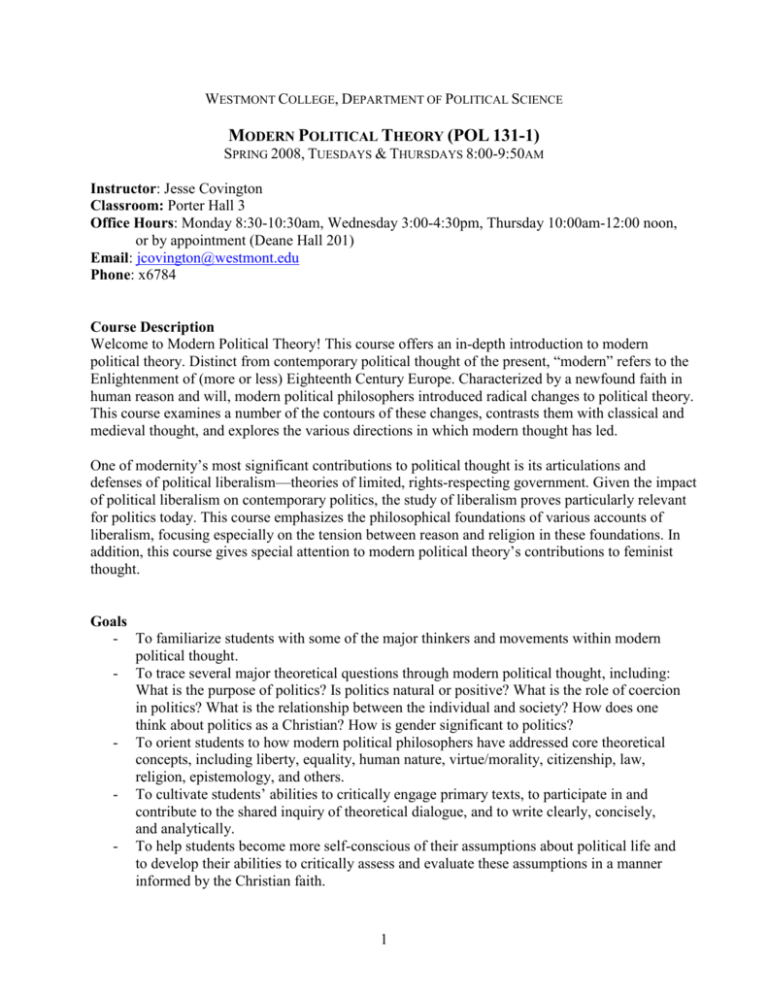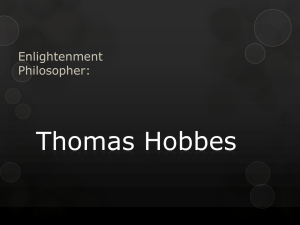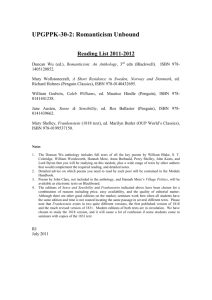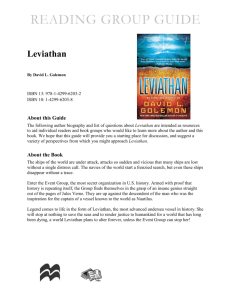Modern Political Theory Readings
advertisement

WESTMONT COLLEGE, DEPARTMENT OF POLITICAL SCIENCE MODERN POLITICAL THEORY (POL 131-1) SPRING 2008, TUESDAYS & THURSDAYS 8:00-9:50AM Instructor: Jesse Covington Classroom: Porter Hall 3 Office Hours: Monday 8:30-10:30am, Wednesday 3:00-4:30pm, Thursday 10:00am-12:00 noon, or by appointment (Deane Hall 201) Email: jcovington@westmont.edu Phone: x6784 Course Description Welcome to Modern Political Theory! This course offers an in-depth introduction to modern political theory. Distinct from contemporary political thought of the present, “modern” refers to the Enlightenment of (more or less) Eighteenth Century Europe. Characterized by a newfound faith in human reason and will, modern political philosophers introduced radical changes to political theory. This course examines a number of the contours of these changes, contrasts them with classical and medieval thought, and explores the various directions in which modern thought has led. One of modernity’s most significant contributions to political thought is its articulations and defenses of political liberalism—theories of limited, rights-respecting government. Given the impact of political liberalism on contemporary politics, the study of liberalism proves particularly relevant for politics today. This course emphasizes the philosophical foundations of various accounts of liberalism, focusing especially on the tension between reason and religion in these foundations. In addition, this course gives special attention to modern political theory’s contributions to feminist thought. Goals - To familiarize students with some of the major thinkers and movements within modern political thought. - To trace several major theoretical questions through modern political thought, including: What is the purpose of politics? Is politics natural or positive? What is the role of coercion in politics? What is the relationship between the individual and society? How does one think about politics as a Christian? How is gender significant to politics? - To orient students to how modern political philosophers have addressed core theoretical concepts, including liberty, equality, human nature, virtue/morality, citizenship, law, religion, epistemology, and others. - To cultivate students’ abilities to critically engage primary texts, to participate in and contribute to the shared inquiry of theoretical dialogue, and to write clearly, concisely, and analytically. - To help students become more self-conscious of their assumptions about political life and to develop their abilities to critically assess and evaluate these assumptions in a manner informed by the Christian faith. 1 Required Texts: Machiavelli, Niccolo. The Prince. Bantam Classics. 2003. ISBN: 0553212788 Hobbes, Thomas. Leviathan. Penguin Classics. 1982. ISBN: 0140431950 Locke, John. Two Treatises of Civil Government. Cambridge University Press. 1988. ISBN: 0521357306 Rousseau, Jean-Jaques. The Social Contract. Penguin Classics. 1968. ISBN: 0140442014 Wollstonecraft, Mary. A Vindication of the Rights of Women. Prometheus Books.1989. ISBN: 0879755253 Marx, Karl and Frederic Engels. Communist Manifesto. Penguin Classics. 2002. ISBN: 0140447571 Mill, John Stuart. 2007. On Liberty and The Subjection of Women. Penguin Classics. ISBN: 014144147X. Additional Readings will be posted on Eureka or distributed as handouts. Please bring the relevant texts with you to class, as they will form the basis of our discussion. Format This is a seminar, not a lecture course. This means that you—the students—will bear great responsibility for our class sessions together. Thoughtful and informed discussion will form the basis of each class period. This means several things. First, it means that I will not lecture, save for when a few organizing comments will be helpful in orienting the class’ approach to a given topic. Instead, I will facilitate a discussion primarily led by you, the students. An informed discussion requires thorough preparation by each member of the class. Without a firm grasp of the assigned reading, class sessions will quickly degenerate either to uninformed opinionsharing or efforts to simply recount what the reading contained. With a command of the reading materials and thoughtful consideration of them prior to class sessions, our meetings can be a thought-provoking time for synthetic, creative, analytical and evaluative thought. Excellent preparation does not mean you will have no more questions about the text. It means instead that you have read, digested, and wrestled with the texts prior to class, and have identified some good questions to ask about the text. I consider a cardinal student virtue to be the asking of probing, challenging and thought-provoking questions that lead the whole class to a better understanding of course material. To facilitate the seminar format, each student will sign up to lead class discussion three times over the course of the semester. Prior to class, the leader will frame and identify 3-5 analytical questions that suggest fruitful lines of inquiry for class discussion. He or she will e-mail these to the rest of the class by 12:00 noon the day prior to class. In class, the leader will offer a brief (5 minute) summary of the reading, and will then lead the class in discussion based on his or her analytical questions. 2 Academic Integrity Each student is expected to maintain honesty in his or her communication and conduct and to submit his or her own work in every context associated with the course, be it papers, examinations, or anything else. Among other things, this means that plagiarism is absolutely prohibited. “Plagiarism” refers to the practice of submitting the work or thinking of someone else as if it is one’s own. This can be as extensive as submitting an entire paper written by someone else, or as little as using an idea without giving credit to its source. Using quotations and interacting with the ideas of others is expected in student writing, but must be rigorously documented by citation and quotation marks (where appropriate). Paraphrasing does not make someone else’s work yours—the ideas must be cited, even if the words are different. When in doubt, always err on the side of caution by citing your sources. Be particularly careful in your use of the Internet. If you use a website to help you on an assignment in any way, be sure to cite it. (There will be times when I indicate that the Internet should not be used at all on an assignment.) You are responsible for knowing Westmont’s plagiarism policy, listed at the web address below www.westmont.edu/_academics/pages/provost/curriculum/plagiarism. If you have questions about it, be sure to ask me. In cases of inappropriately shared material within the class (e.g., copying test answers, papers, etc.), the student whose work is being copied will be held liable as well. Failure to maintain academic integrity constitutes both stealing and lying (see Exodus 20:15-16). It violates the policies of Westmont College and is a breach of trust that damages your relationship with me and your relationships with your fellow students. A violation of academic integrity is reported to the administration and will result in serious disciplinary consequences. Don’t do it. Classroom Policies - Turn cellular telephones off. If your phone rings during class, I reserve the right to answer it. - Please come to class properly attired. We will engage in serious intellectual dialogue, so dress as someone who wishes to be taken seriously. - Avoid anything that tends to distract you or others from full participation. Examples include arriving late, noisy snacks, private conversations during class, text-messaging, surfing the internet, etc. Students with Disabilities: If you have special needs related to your coursework or examinations and have established these with the Office of Disability Services (x6159), please let me know as soon as possible so that we can come up with a plan that best meets your needs. References: From time to time, students ask me to complete reference forms or letters of recommendation for them. I am happy to do these. In order to write the best possible recommendation, I will need at least two weeks notice prior to the deadline. Also, I will ask you for as much information as possible and will usually ask to meet with you outside of class to discuss the program or position for which you are applying. 3 Requirements Preparation, Participation, and Attendance—15% Attendance: Completing the readings and showing up for class are absolutely essential for success this course. Given the discursive nature of the seminar and its small size, all absences will have a significant impact. I recognize, however, that things do come up. Therefore, I will grant each student two absences during the semester. Please let me know that you will be missing class ahead of time, along with the reason for the absence. Additional absences will result in a reduction of this portion of your grade. If you know ahead of time that you will need to miss more than two classes or if any other sort of extraordinary situation arises, please meet with me. Preparation: Full preparation for class entails reading all of the assigned texts, taking reading notes on the texts, and thoughtfully considering the reading’s content. I reserve the right to evaluate preparation in a number of ways. Participation: As noted above, class participation is key in a seminar of this kind. Full engagement with the class in dialogue is essential to the learning of your peers. I expect each member of the class to participate in a way that is helpful to the whole class. For those who are not outspoken, this may mean only several insightful questions or comments per class. Others may participate far more, but are encouraged to take responsible care in doing so, ensuring that they speak in ways that help others learn and help others participate as well. Short Papers—15% Each student will write six short (2-page) papers. The first page of the paper should summarize the most important ideas in the reading for that class period. The second page should be a critical analysis of the reading or some major aspect of it. Finally, each student should append 3-5 probing questions about the day’s reading. I will distribute and review a handout giving further guidelines for the short papers. These papers will help you learn to read philosophical texts with comprehension, distilling their content and subjecting it to critical scrutiny. They will also make for fruitful classroom discussions, as they require real engagement with the material prior to class. Although you can choose when/what texts you want to write about, each paper must be on a different author. Three of the papers should be submitted on the days that a student is signed up to lead class discussion. These papers are due at the beginning of class and should be about two pages long (word count 500-700—this maximum is absolute). Please use double-spacing with 1-inch margins and a 12-point font. Your name should be on every page. The first page should also include your class number, date of submission, and a word-count. These papers cannot be turned in late. Midterm Examination—20% Tuesday, February 26 4 Research Paper—25% (Due Friday, April 18th at 4:00pm @ Deane Hall 201) This will be a 12-15 page paper in which you explore a particular problem of your choosing within modern political theory. I will distribute a handout describing the requirements for this in more detail. Final Examination—25% Monday, April 28 8:00-10:00am Schedule (The schedule below outlines when we will consider various primary texts. Where they are not listed, I will provide specific page numbers as we go along, and will distribute additional reading materials from time to time via handouts or Eureka.) January 8—Introductions; Syllabus Review January 10—Niccolo Niccolo Machiavelli The Prince (p. 15-65) January 15— Niccolo Machiavelli The Prince, Discourses (selections; p. 65-132) January 17—Thomas Hobbes Leviathan (Ch. 6, 7, 8—p. 118-147 & Ch. 11—p.160-168) January 22—no class (Monday schedule) January 24—Thomas Hobbes Leviathan (Ch 13-16—p. 183-222) January 29—Thomas Hobbes Leviathan (Ch. 17-18—p. 223-239; Ch. 20-21—p. 251-274; last 2 paragraphs of Ch. 26—p. 334-5) January 31— Sir Robert Filmer Patriarcha (selections—handout) February 5— John Locke Two Treatises of Government / Alan Charles Kors (handout) February 7— John Locke Two Treatises of Government (p. 267-318) February 12— John Locke Two Treatises of Government (p. 318-380) February 14— John Locke Two Treatises of Government (380-428) February 19—no class (President’s weekend) February 21— John Locke TBA February 26— Midterm Examination February 28—Jean Jacques Rousseau The Social Contract March 4—Jean Jacques Rousseau The Social Contract March 6—Jean Jacques Rousseau The Social Contract March 11—Jean Jacques Rousseau The Social Contract March 13— Mary Wollstonecraft A Vindication of the Rights of Women (p. 9-60) March 18—No Class (Easter Break) March 20—No Class (Easter Break) 5 March 25—Mary Wollstonecraft A Vindication of the Rights of Women (p. 61-122) March 27— Mary Wollstonecraft A Vindication of the Rights of Women (p. 123-167) April 1— Mary Wollstonecraft A Vindication of the Rights of Women (p. 169-206; tba) April 3—Marx & Engels The Communist Manifesto April 8—Marx & Engels The Communist Manifesto April 10—J.S. Mill On Liberty April 15—J.S. Mill On Liberty April 17—J.S. Mill The Subjection of Women April 22—J.S. Mill The Subjection of Women April 24—Course Conclusion (no reading due) 6










